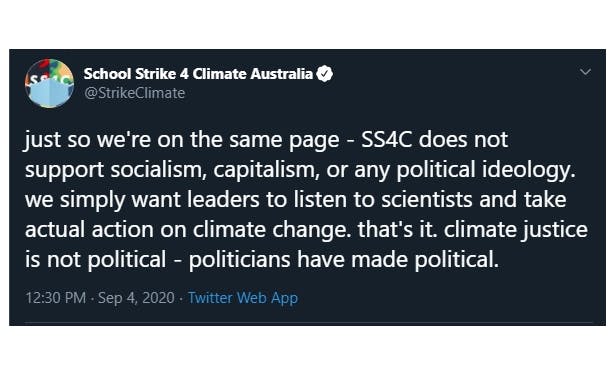When climate strikers deny politics, they support the status quo

Despite decades of warnings from scientists about the urgent need to curb greenhouse gas emissions to avoid catastrophic global warming, we’re in a worse situation today than ever. Global emissions hit a new high in 2019, and even this year’s economic shutdowns have barely dented the upwards trajectory.
In the face of impending catastrophe, only the most sober assessment of our situation will do. We should, for a start, reflect on whether the approach of the environment movement over the past three decades—which has centred on trying to explain things more clearly to politicians and other “decision-makers”, with a bit of polite protest here and there—is something we should press on with.
Unfortunately, all indications are that many in the climate movement are not going to draw any lessons from this failed approach but are simply going to continue with it. In Australia, the organisation responsible for calling the largest climate justice demonstrations in the country’s history—School Strike 4 Climate Australia—has declared that it is not interested in engaging with any serious alternatives to the status quo.
In a 4 September tweet, the group explained, “SS4C does not support socialism, capitalism, or any political ideology. We simply want leaders to listen to science and take actual action on climate change. That’s it. Climate justice is not political—politicians have made it political”.
To say this is a shallow and misguided perspective is overly generous. If you can look at the past three decades of failures of the climate movement and conclude that the problem is “politics”, and that the whole thing will be fixed if politicians just “listen to science”, then you’ve given up on critical reason.
Our leaders have ears. Scott Morrison has hundreds of advisers at his disposal to brief him on the latest climate science or any other issue he might want to get his head around. He, like the rest of us, saw what happened to the forests of eastern Australia last summer. The problem isn’t that he hasn’t, or won’t, “listen to science”. It beggars belief that Morrison and his colleagues are somehow unaware of the dangers of climate change. The reality is that they’re aware, they can see its devastating impacts already unfolding around them, and yet they push on with the status quo of Australia’s fossil fuel economy regardless.
Why he and the political establishment continue to ignore science is what needs to be explained. But this question is what SS4C appears determined not to engage with—when you begin to answer the question, you are confronted with the reality that climate change, and every other environmental issue with which our society is afflicted, is inherently political and can’t be understood otherwise.
Politics is concerned with the way we choose to organise our economy and society. The dominant politics of the past 200 years is that of capitalism, a system in which society is divided into classes and in which a tiny minority own and control the land and the productive resources we depend on.
The capitalist ruling class decides what gets made, what it’s made of, how much is made, where it goes and how it is disposed of. And as Andreas Malm explains in his book Fossil Capital, it was the capitalist ruling class that decided, in the early 19th century, to centre its system on the consumption of massive quantities of fossil fuels. It did this, and continues to this day to do this, because it was the thing that generated the biggest profits in the shortest time.
Capitalist states such as Australia’s aren’t independent of the system over which they preside. In the early years of capitalism, the politicians who ran the state didn’t even pretend to govern on behalf of everyone in society. These days, a façade of democracy is maintained, but the core function of the state remains to advance the interests of the capitalist class.
For Morrison and his colleagues (and we can include Anthony Albanese and other Labor Party leaders in this too), “good governance” means governing in a way that protects and advances big business profits. And Australia is a country in which the fortunes of almost the entire capitalist class are tied, more or less directly, to the fossil fuel economy.
It should be no surprise, then, that Australian politicians of all stripes have been so backwards on climate change. The tens of billions in annual profits flowing into the hands of Australia’s fossil fuel barons speak much louder than the politely worded reports of scientists warning about the possible dangers of climate change in the long term.
If you can’t or won’t recognise this reality, you’re going to keep banging your head against the wall. The climate movement will never win if it attempts to counter the entrenched economic and political power of the fossil fuel industry with the (however clearly argued) words of scientists. Our focus, rather, has to be on how to build a force that can challenge the entire profit-driven system of capitalism, and force politicians to act whether they “listen to the science” or not.
We won’t get to this point, however, if we persist with the perspective outlined in SS4C’s tweet. Its “apolitical” orientation may, at best, result in minor tweaks to the status quo. But minor tweaks won’t be enough in the context of a system that is rapidly driving us towards a global climate catastrophe. Only mass action to force a radical change of direction will suffice.
Pruning the poisonous, invasive weed of capitalism is not sufficient—we need to destroy it at the root. Only a system built on human need, collectively organised by workers and freed from the destructive pursuit of profit, can save the planet.